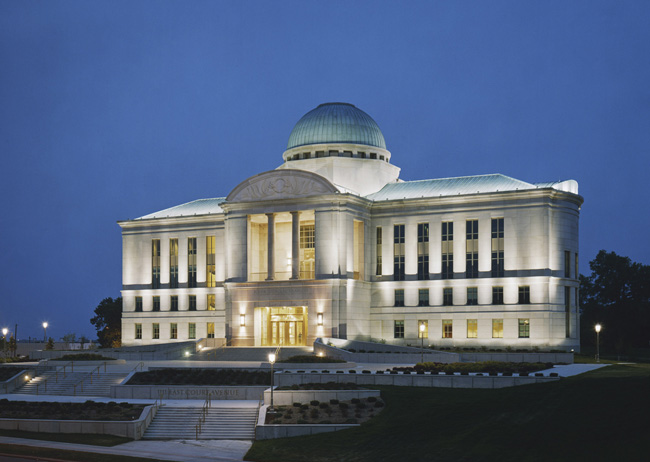House seeks to alter Supreme Court nominations
February 23, 2011
DES MOINES — After targeting the Iowa Supreme Court during the 2010 elections — where three justices were voted out in a controversial retention for their same-sex marriage decision — House Republicans are now looking to change the system within the high court operates.
Iowa House Republicans have filed several pieces of legislation that would create term limits for justices, change the nominating commission and also a resolution to make selection of Supreme Court appointees more like the federal system.
Gov. Terry Branstad has said he would favor changing the system, in light of the effort by conservative activists to kick out three Supreme Court justices. Branstad had appointed two of them.
The governor did not respond specifically to the proposed legislation, when asked about it earlier this week.
“I do have concerns about the present system and I’d like to see if there’s ways we can improve it to really provide the balance that we need on the Supreme Court and to represent the people of Iowa,” Branstad said.
Branstad finished his picks for the high court, after reviewing them with his legal counsel Brenna Findley, the former chief of staff to Rep. Steve King, R-Iowa; Lt. Gov. Kim Reynolds; and Chief of Staff Jeff Boeyink.
Bob Vander Plaats, who lead the charge to successfully oust the judges and is head of the Family Leader, has since called on the remaining four justices to resign.
Tony Perkins, president of the Family Research Council that was declared a hate group by the Southern Poverty Law Center, said on the steps of the Iowa Supreme Court building in October 2010 that he favored having judges elected by popular vote. The Family Research Council, along with the American Family Association, National Organization for Marriage and Citizens United, contributed nearly $2 million on the effort against the justices.
Iowa operates under the “Missouri plan,” where judges do not run to be elected, to avoid politicizing the courts. However, they do face retention elections.
Under the Missouri plan, adopted in 1962, Iowa’s Supreme Court justices are interviewed by a 14-member nominating commission, comprised of seven picks by the governor and seven by the Iowa State Bar Association. For each vacancy on the bench, they select three nominees to present to the governor, who then appoints one to the high court.
Former U.S. Supreme Court Justice Sandra Day O’Connor visited Iowa in September and praised Iowa’s court system. The U.S. Chamber of Commerce also consistently ranks Iowa’s courts as a national leader in objectivity and fairness.
House File 343, filed by state Rep. Chris Hagenow, R-Windsor Heights, would drastically alter the ISBA’s role in the Supreme Court nominating commission by making their appointees “non-voting advisory members.”
Currently, the nominating commission members, comprised of ISBA picks and members of the general public appointed by the governor, all hold an equal vote.
The bill would also replace the senior justice with the lieutenant governor as the chairperson of the commission. And it would prevent a justice who was ousted in a retention vote from becoming a justice on the high court again, although that has never happened since the adoption of the Missouri plan.
HF 343 would go so far as to declare odd numbered districts must have a woman representing them by the ISBA on the commission, and even numbered districts represented by men. This would alternate for every time that commission member is replaced.
During the campaign, Branstad wouldn’t state an opinion on the retention election. However, he did say he advocated changing the nominating system. He said on an appearance on WHO-AM radio he’d prefer something similar to the federal style, where could pick anyone and it would go before the Senate to be confirmed.
His wish may be granted, if House Joint Resolution 12 is passed and adopted to the state constitution, in turn making HF 343 irrelevant.
The resolution repeals the Missouri Plan effective Jan. 1, 2015, and would also include the same process for district court appointments. The Court of Appeals is left untouched.
In its place, the governor would have the ability to select anyone for a vacancy and have them go before the Iowa Senate to be confirmed.
If passed, the proposed amendment to the state constitution would need to be passed again in 2013 before going on the ballot in the following election to be ratified by voters.
The measure does not include anything on how long justices would serve. “Each Supreme Court justice would serve for six years after serving an initial term of office of up to two years. A Supreme Court justice or a district judge would not serve more than two succeeding terms of office,” according to House Joint Resolution 13.
Both resolutions would need to be passed by two assemblies, then put before the general electorate to amend the constitution.
HJR 12 and 13 sponsors include Iowa Republican Reps. Dwayne Alons, Tom Shaw, Kim Pearson, Royd Chambers and Betty De Boef. Republicans Glen Massie and Mark Lofgren also signed on to HJR 12.
The League of Women Voters and the ISBA have already declared their opposition to the proposed constitutional amendments.







